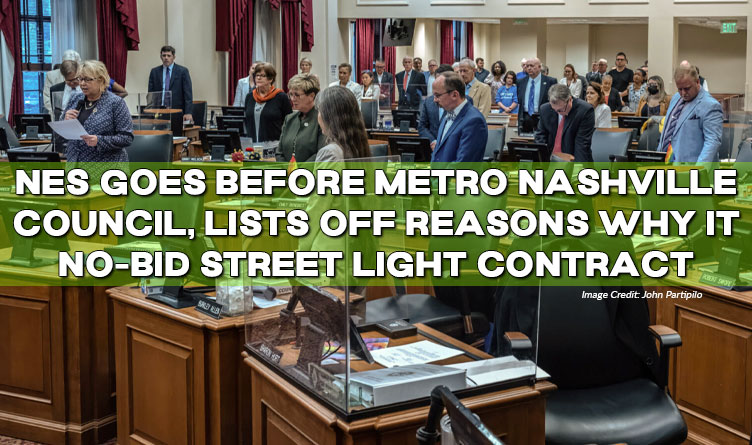The utility provider told council members to compare its deal to Philadelphia’s, which cost 12% less per street light fixture, was competitively bid out and has a faster completion timeline.
Image Credit: John Partipilo
By Adam Friedman [Tennessee Lookout -CC BY-NC-ND 4.0] –
Nashville Electric Service officials appeared before two Metro Nashville Council committees Monday to defend a $47 million no-bid contract to upgrade the city’s street lights to LED fixtures.
Antonio Carroll, an attorney with Nashville Electric Service (NES), told Metro Council members state law allows the utility provider to use a professional services exemption when choosing a street light contractor.
“Price is an important factor when you’re looking at a project of this magnitude and determining a streetlight vendor, but quality is just as important,” Carroll said during the council’s budget and finance committee.

Earlier this year, the Metro Council approved an agreement with NES to replace Nashville’s 55,000 street lights with LED fixtures to improve visibility for walkers and drivers, lower emissions, reduce annual costs and make it easier to track outages.
The company chose Memphis-based Path Company to complete the $46.8 million project instead of going through a bidding process or requesting multiple offers.
Carroll said NES chose Path because the company has a proven track record of working with NES on LED projects in the smaller cities surrounding Nashville.
But by not soliciting other offers, Nashville will spend more money and the project is estimated to take longer to complete compared to cities like Memphis and Philadelphia, which signed similar street light conversion deals in 2022.
The final NES cost is roughly $851 per light replacement. In contrast, a similar project undertaken by Memphis’ utility provider last year will cost it $608 per fixture, 29% less than what NES is paying.
Memphis used a request for proposal process to receive 11 bids on the contract approved in August 2022, according to the Daily Memphian. Memphis is replacing 77,300 lights for $47 million.
Carroll told council members inflation was another reason for the increased cost compared to Memphis, adding a better comparison would have been Philadelphia.
The Philadelphia Energy Authority used a competitive bidding process to sign its street light upgrade deal in May 2022. The Philadelphia utility provider is spending $90 million to replace 120,000-130,000 street lights, costing around $750 per fixture, or 12% less than NES.
NES contends that Philadelphia’s contract is for 112,500 street lights costing $92 million, or $776 per light, contrary to public reports. The company also said its contract with Path is $42.7 million not $46.8 million, which is the total cost with the 9.6% contingency in the contract, coming out to $818 per fixture.
“NES and the utility industry in general has seen increased shortages of materials,” an NES official said in an email response to questions from the Lookout.
“Transformers, wires, and even poles have been in short supply. As such, these materials shortages have spurred inflationary price increase and upward pressure on prices of goods that are vital to the operation of the electric distribution system. We have seen significant cost increases in material, equipment and resources in the past 18 months.

The NES official who responded to the Lookout did not identify themselves. NES attorney Carroll told council members another reason the public utility company chose not to hold a competitive bidding process because it would speed up the project’s timeline by 12-18 months.
But Nashville’s street light upgrade project will take five years to complete without bidding, while competitively bid deals in Memphis and Philadelphia will take between 1-3 years to complete.
“NES chose a more methodical approach that will allow us to verify the lighting installations and provide more detailed engineering,” NES said in its email to the Lookout. “Additionally, this allows a more prudent coordination with NDOT about appropriate LED fixture for each location.
Another comparison to use is Kansas City, which used a competitive bid process to sign a deal in January 2022 to upgrade 84,000 street lights to LEDs for $21 million, costing $250 per fixture, according to KCUR an NPR-affilate in Kansas City. The project in Kansas City will take three years to complete.
“From what I read, Path is a good company,” said Tasha Ellis, a Metro Nashville Council member on the transportation and infrastructure committee, which also questioned NES officials Monday. “Other municipalities that have used them have had good experiences with their performance, and they do deliver on quality.
“But it should be an open and fair process when it comes to bidding on jobs.”





One Response
“Antonio Carroll, an attorney with Nashville Electric Service (NES), told Metro Council members state law allows the utility provider to use a professional services exemption when choosing a street light contractor.”
No, they can use the no-bid exemption to hire professional services such as an attorney, architect or engineer. The public school system also has an exception to hire construction managers for school construction (which ends up the same way, no competitive bid and expensive). Tim Burchette was partly responsible for that legislation. They want to call a “design-build” contractor a professional service even when the contractor is the designer, specifier and the installer. None of the subcontracts are public and neither are the prices.
E.g.: you hire a design-build firm to buy a pickup truck with no engineering, specifications or competitive bid. They give you a maximum price guarantee of $90k (plus a 10% contingency) and promise to deliver a truck to you in a year’s time. What kind of truck? Gas or diesel, 4wd or 2wd, 1500, 2500 or 3500, crew cab or regular cab? Did you specify or just say you wanted a truck? Say the most expensive truck costs $85k and you could order and get it in 6 months. They give you a truck (maybe even what you wanted) for $95k in 10 months and pat themselves on the back for being early and under budget. Your commission brags about how they saved money. That’s how the school system does it. And the state is always courting your commissioners to spend no-bid money with their “approved” contractors. They will even advertise your project with some newspaper in Hawaii to meet legal requirements and then some out of town-out of state contractor of their choosing is the only bidder. Because he reads newspapers in Hawaii…